For the 2025 school year, there is 1 public preschool serving 576 students in Granger School District. This district's average pre testing ranking is 2/10, which is in the bottom 50% of public pre schools in Washington.
Public Preschool in Granger School District have an average math proficiency score of 27% (versus the Washington public pre school average of 43%), and reading proficiency score of 22% (versus the 49% statewide average).
Minority enrollment is 97% of the student body (majority Hispanic), which is more than the Washington public preschool average of 54% (majority Hispanic).
Overview
This School District
This State (WA)
# Schools
3 Schools
801 Schools
# Students
1,405 Students
280,418 Students
# Teachers
87 Teachers
17,799 Teachers
Student : Teacher Ratio
16:1
16:1
District Rank
Granger School District, which is ranked within the bottom 50% of all 306 school districts in Washington (based off of combined math and reading proficiency testing data) for the 2021-2022 school year.
The school district's graduation rate of 80-84% has increased from 75-79% over five school years.
Overall District Rank
#283 out of 307 school districts
(Bottom 50%)
(Bottom 50%)
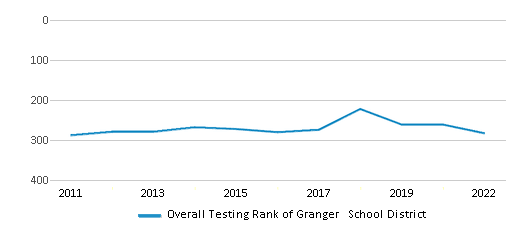
Math Test Scores (% Proficient)
17%
40%
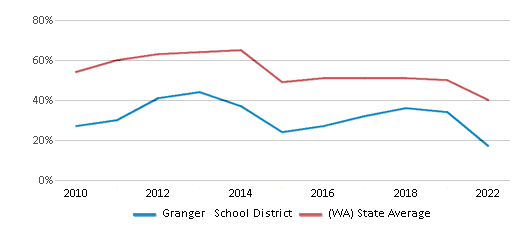
Reading/Language Arts Test Scores (% Proficient)
28%
53%
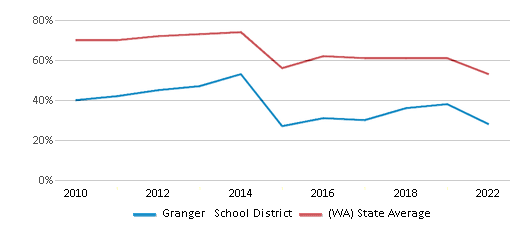
Science Test Scores (% Proficient)
29%
49%
Graduation Rate
80-84%
84%
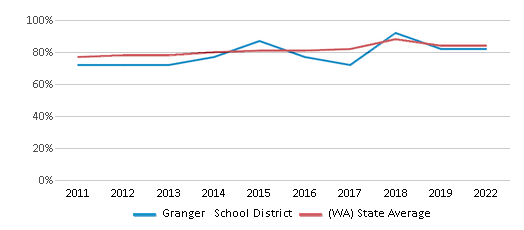
Students by Ethnicity:
Diversity Score
0.11
0.71
# American Indian Students
37 Students
2,844 Students
% American Indian Students
3%
1%
# Asian Students
n/a
25,971 Students
% Asian Students
n/a
9%
# Hispanic Students
1,324 Students
73,094 Students
% Hispanic Students
94%
26%
# Black Students
2 Students
16,473 Students
% Black Students
n/a
6%
# White Students
34 Students
129,086 Students
% White Students
2%
46%
# Hawaiian Students
n/a
5,103 Students
% Hawaiian Students
n/a
2%
# Two or more races Students
8 Students
27,229 Students
% of Two or more races Students
1%
10%
Students by Grade:
# Students in PK Grade:
64
23,952
# Students in K Grade:
103
43,573
# Students in 1st Grade:
104
42,048
# Students in 2nd Grade:
92
43,955
# Students in 3rd Grade:
104
39,809
# Students in 4th Grade:
109
41,098
# Students in 5th Grade:
94
39,252
# Students in 6th Grade:
92
3,085
# Students in 7th Grade:
113
1,010
# Students in 8th Grade:
122
1,067
# Students in 9th Grade:
98
319
# Students in 10th Grade:
116
337
# Students in 11th Grade:
95
333
# Students in 12th Grade:
99
580
# Ungraded Students:
-
-
District Revenue and Spending
The revenue/student of $18,978 is higher than the state median of $18,796. The school district revenue/student has stayed relatively flat over four school years.
The school district's spending/student of $18,480 is less than the state median of $19,246. The school district spending/student has stayed relatively flat over four school years.
Total Revenue
$27 MM
$20,715 MM
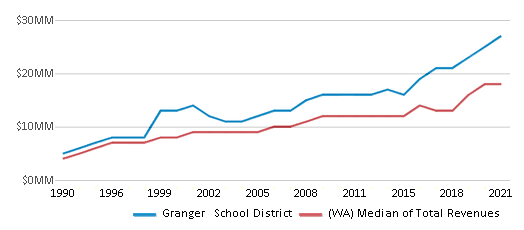
Spending
$26 MM
$21,212 MM
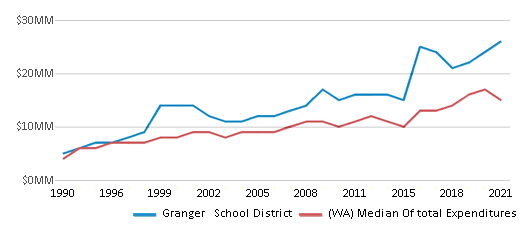
Revenue / Student
$18,978
$18,796
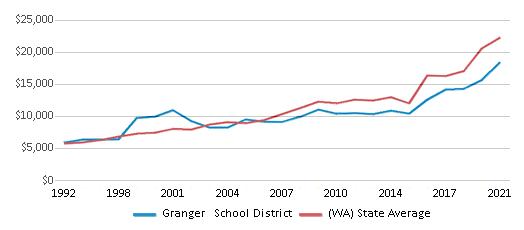
Spending / Student
$18,480
$19,246
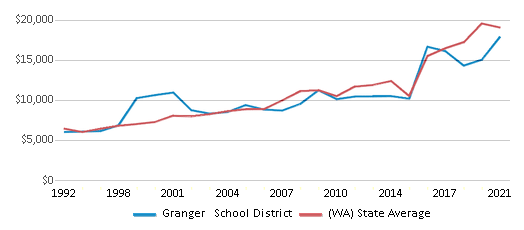
Best Granger School District Public Preschools (2025)
School
(Math and Reading Proficiency)
(Math and Reading Proficiency)
Location
Grades
Students
Rank: #11.
Roosevelt Elementary School
(Math: 25-29% | Reading: 20-24%)
Rank:
Rank:
2/
Bottom 50%10
405 Bailey Avenue
Granger, WA 98932
(509) 854-1420
Granger, WA 98932
(509) 854-1420
Grades: PK-4
| 576 students
Recent Articles

Year-Round Or Traditional Schedule?
Which is more appropriate for your child? A year-round attendance schedule or traditional schedule? We look at the pros and cons.

Why You Should Encourage Your Child to Join a Sports Team
Participating in team sports has a great many benefits for children, there is no doubt. In this article you will learn what those benefits are.

White Students are Now the Minority in U.S. Public Schools
Increasing birth rates among immigrant families from Asia and Central and South America, combined with lower birth rates among white families, means that for the first time in history, public school students in the United States are majority-minority. This shift in demographics poses difficulties for schools as they work to accommodate children of varying language abilities and socio-economic backgrounds.





